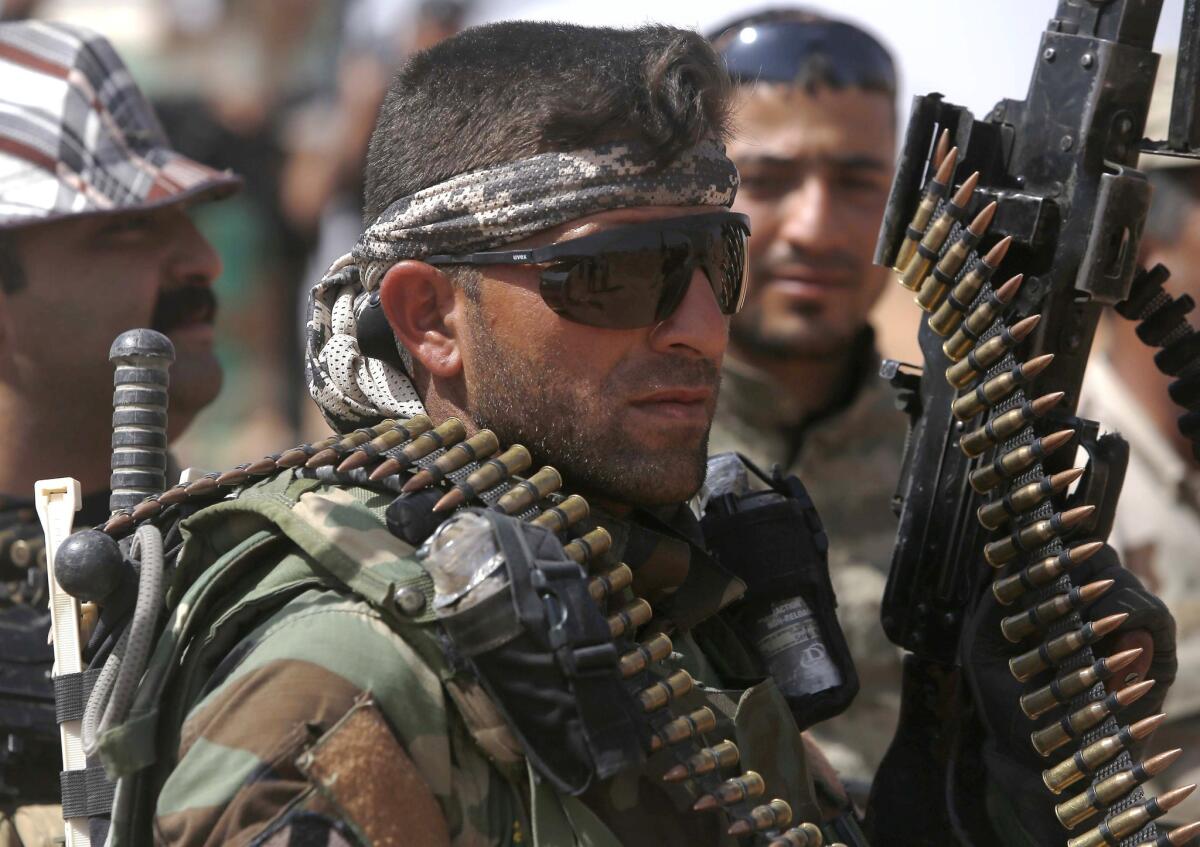Iraq boosts recruitment in bid to retake Ramadi from Islamic State

An Iraqi fighter with the Shiite Muslim Al Abbas militia unit near the village of Nukhayb in embattled Anbar province west of Baghdad on May 19.
- Share via
Reporting from Beirut — Iraqi authorities on Tuesday ramped up recruitment of volunteers to join pro-government forces fighting Islamic State, official news media said, as American officials tried to downplay gains by the militants that appeared to constitute a sharp setback for U.S. interests.
Government forces beat back several Islamic State assaults on the town of Khaldiya, about 15 miles east of the city of Ramadi and 50 miles west of the capital, Baghdad, according to statements from the Defense Ministry.
Islamic State fighters seized Ramadi on Sunday, pushing out government forces who fled hurriedly in a scene reminiscent of the army’s humiliating collapse in June in the city of Mosul.
Iraqi officials have vowed to recapture Ramadi, the capital of Anbar province, but the loss undermines recent U.S. claims of progress in its efforts to dislodge the Sunni extremists in Iraq and Syria through a mix of airstrikes, support for the Baghdad government and its armed forces and other efforts.
Khaldiya, where fighting was focused Tuesday, borders the Habbaniya area, where pro-government forces have been assembling in anticipation of a wide-scale campaign to drive the Sunni militants from Ramadi. The government forces include largely Shiite Muslim militias known as Popular Mobilization Units.
On Tuesday, Iraq’s Council of Ministers issued a statement “calling for voluntary recruitment to add new forces in the army.” It also confirmed “the government’s obligation to recruit and arm” Sunni tribal fighters in Anbar, a predominantly Sunni province where many residents deeply distrust the Shiite-dominated central government and allied Shiite militias.
But the Shiite paramilitaries, perhaps the strongest pro-government force in Iraq, now appear vital to any campaign to retake Ramadi, despite widespread fear that deploying them broadly in Iraq’s Sunni heartland may deepen the nation’s sectarian divide.
The U.S. military has accelerated airstrikes against Islamic State in the Ramadi area and has pledged to provide assistance to the Washington-backed government in Baghdad.
President Obama met with top security advisors at the White House to consider adjusting strategy in light of the Islamic State success in Ramadi.
White House Press Secretary Josh Earnest argued that the strategy has “yielded important successes” and does not need substantial revision.
“Are we going to light our hair on fire every time there’s a setback?” Earnest said.
Pentagon planners do not believe that Ramadi’s fall, while discouraging, gives Islamic State a foothold to threaten Baghdad.
“They had controlled 80% to 90% [of Ramadi] for a while and now they have the whole thing,” said a senior U.S. military officer, who spoke on condition of anonymity in discussing internal deliberations. “It hasn’t shifted the overall battlefield that much.”
In any case, U.S. options are limited for now.
Pentagon planners are reluctant to use airstrikes in an urban area such as Ramadi because of the high risk of civilian casualties. And they are wary of appearing to support the sectarian militias, some of which are backed by Iran.
U.S. officials said they will wait until the Iraqi army is ready to reclaim the city before assisting with airstrikes, intelligence and tactical advice.
“They will determine the timelines. They will determine the planning. They will determine the resourcing,” said Col. Steve Warren, a Pentagon spokesman.
Anbar was the hub of the Sunni insurgency against U.S. forces after the U.S.-led invasion that toppled Iraqi President Saddam Hussein in 2003. A massive U.S. offensive in November 2004 took back the city of Fallouja in Anbar from Sunni militants linked to Al Qaeda.
Fallouja is also now in the hands of Islamic State, an Al Qaeda breakaway faction that controls vast swaths of Iraq and neighboring Syria and has been the target of the U.S.-led bombing campaign for nine months.
The Popular Mobilization Units spearheaded a successful government offensive in March to rout Islamic State from the central province of Salahuddin, but the militiamen were not initially deployed in strength in Anbar because of sectarian sensitivity.
McDonnell reported from Beirut and Richter from Washington. Special correspondent Nabih Bulos in Beirut contributed to this report.
Follow @mdcneville for news from Iraq and Syria
More to Read
Sign up for Essential California
The most important California stories and recommendations in your inbox every morning.
You may occasionally receive promotional content from the Los Angeles Times.










